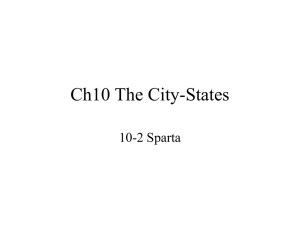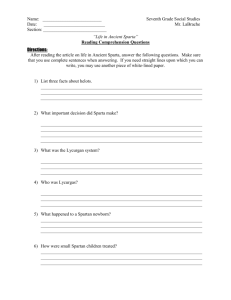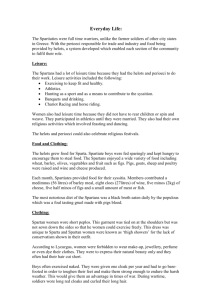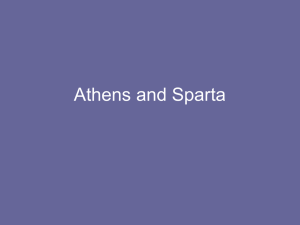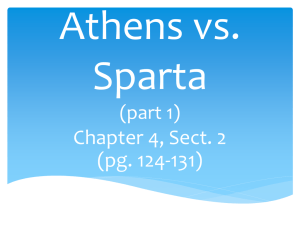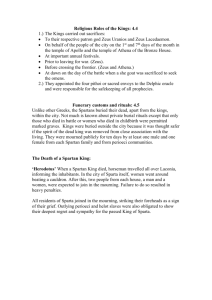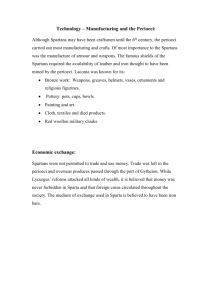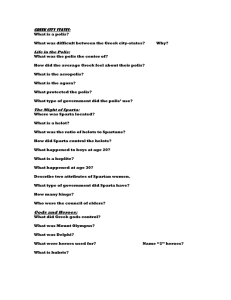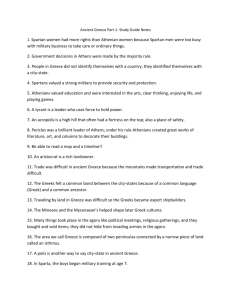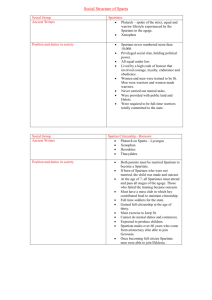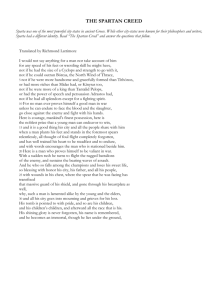The Polis and Sparta
advertisement
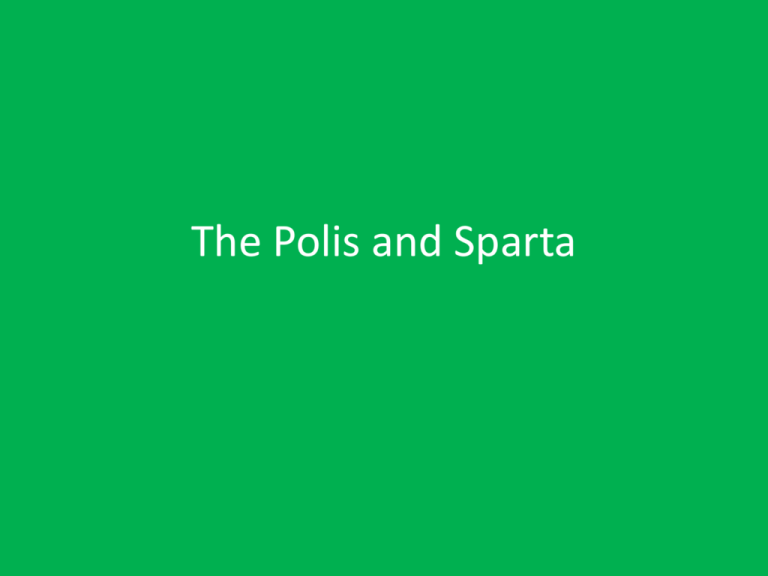
The Polis and Sparta Vocabulary: • Polis – a Greek city-state • Acropolis – a protected (fortified) hill in Greek citystates • Agora- ancient Greek marketplaces, a large open area in the center of the city-state • Agoraphobia – the fear of open areas Vocabulary: • Peloponnesus – Southern area of Greece • Aristocrats – Greek nobles, members of the upper class • Assembly – Spartan Council, passed laws and declared war and peace • Ephors – Spartan gov’t leaders Vocabulary: • Council of Elders – group of Spartan citizens 60yrs or older that assissted the Ephors, suggested laws to the assembly, and served as a high court • Helots – enslaved people that were owned by a city state • Perioeci – merchants and artisans that worked in Spartan villages I. Polis • Center of Greek Life • Consisted of farms and villages that surrounded an acropolis – a temple dedicated to the town god was located at the top – An agora, open market, area developed at the bottom of the hill I. Polis • City-States were not united, each had their own laws • Citizens = any male born in Greece (5,000 – 10,000 in the average city-state) – Workers born outside of Greece, women, children, and slaves could NOT become citizens – Citizens were the only ones to vote, own land, participate in gov’t, and speak in court – Citizens were expected to take part in gov’t and serve in the military “How is this similar to the United States?” I. Polis • Polis Honor = Personal Honor • 2 largest Polis in Greece: - Sparta = Strongest Army - Athens = Strongest Navy II. Sparta • 1st great military power in Greece • Located in Peloponnesus around 500 BC • Kings ruled until the Aristocrats took over and crowned 2 kings – Aristocrats took most of the ruling power away from the kings – Kings were simply military leaders II. Sparta • ONLY Aristocrats could be citizens in Sparta: – All citizens 20yrs and up were part of the assembly that would vote on the laws of the city-state – Ephors were chosen to lead Sparta and guide the education of young Spartans – Council of Elders assisted the Ephors in ruling the land III. Aristocrats, Helots, Perioeci • Spartans did not farm, they depended on the Helots to grow crops – Helots, seen as lower class – They were forced to give ½ of their crops to the Spartan gov’t – Were NOT Citizens III. Aristocrats, Helots, Perioeci • Spartans did not participate in business or trade, they depended on the Perioeci to make and sell them the goods they needed – Were not slaves as the Helots, but were NOT Citizens – Slightly higher status then the Helots III. Aristocrats, Helots, Perioeci • Helots and Perioeci did the work needed for survival, while the aristocrats trained for the military • Attention was not paid to trade or the arts • Helots and Perioeci outnumbered the Aristocrats 20 – 1 – The Aristocrats did not want to change and kept strict control over the 2 groups to avoid rebellion IV. The Spartan Way of Life • #1 Goal become the STRONGEST people in Greece • Babies were inspected by the elders at birth any that were sickly or weak were left to die on the mountain • At the age of 7 boys were sent off to military school – Learned how to read, write, and use weapons – Used very harsh training conditions to make them strong IV. The Spartan Way of Life • Spartan men married at 20 –They could not leave the barracks to have their own homes, had to sneak off to visit their wives –Age 30 they could leave the barracks, but still had to preform military service –Age 60 they retired from military service IV. The Spartan Way of Life • Spartan women were able to interact freely with men ⁻ These girls learned how to read and write, they also participated in sports just like the men • Spartans were afraid of change and new ideas - How do you think this hurt their society? - How do you think this was helpful? IV. The Spartan Way of Life • Because of the resistance to change other citystates developed faster than Sparta •SPARTA’S ONLY GOAL WAS TO BECOME THE STRONGEST ARMY IN GREECE
